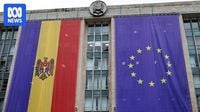Just days before a pivotal parliamentary election, Moldova has been rocked by the arrest of 74 individuals accused of participating in a Russia-backed plot to incite violent unrest and destabilize the country. The sweeping crackdown, which involved 250 police raids across multiple localities on September 22, 2025, is the latest flashpoint in Moldova’s ongoing struggle to safeguard its fragile democracy from foreign interference.
According to the Moldovan National Police and the Organized Crime Prosecutor’s Office, the suspects had systematically traveled to Serbia for training, where they learned firearms handling, crowd-control tactics, and methods for provoking disorder during protests. Most of the instructors were Russian citizens, and authorities allege that Russian security services orchestrated the operation from abroad. Victor Furtună, head of Moldova’s Organized Crime Prosecutor’s Office, told reporters that the suspects, aged between 19 and 45, were paid around 400 euros each for their participation and were taught how to resist detention by authorities.
The raids, which included searches at four prisons, led to the seizure of weapons, ammunition, camouflage clothing, tents, passports, and other materials. Investigators also uncovered links between the suspects and both Moldovan political parties and criminal groups. Socialist Party leader Igor Dodon confirmed that four members of his party were among those detained. If convicted, the suspects face prison sentences ranging from four to eight years.
President Maia Sandu, Moldova’s pro-Western leader, did not mince words in her reaction to the arrests. She asserted that the Kremlin is spending "hundreds of millions of euros" to try to sway the upcoming election. "People are intoxicated daily with lies," Sandu declared, according to the Associated Press. "Hundreds of individuals are paid to provoke disorder, violence, and spread fear. ... I appeal to all citizens: we must not allow our country to be handed over to foreign interests." She further warned, "The Kremlin has accomplices here in Moldova," describing them as people "willing to sell out their country for money."
The parliamentary election, scheduled for Sunday, September 28, 2025, is widely viewed as a crossroads for Moldova’s future. Voters will choose a new 101-seat legislature, and the outcome will likely determine whether the country continues on its path toward European Union membership or pivots back toward closer ties with Russia. Moldova, a small former Soviet republic nestled between Ukraine and Romania, has been a geopolitical battleground for years, with Moscow and Brussels vying for influence.
Since Russia’s full-scale invasion of Ukraine in 2022, Moldova has accelerated its westward shift, applying for EU membership and being granted candidate status that same year. Accession negotiations with Brussels opened in 2024, a move that further irked Moscow and heightened tensions between the two nations. Against this backdrop, the allegations of a Russia-backed plot to disrupt the election have stoked fears about the resilience of Moldova’s democratic institutions.
Authorities say the investigation into the alleged plot began in July 2025, prompted by intelligence that criminal elements were systematically recruiting Moldovan citizens for foreign training. Alexandru Musteața, head of Moldova’s intelligence service, told NewsMaker that the operation was coordinated by Russian security services, with on-the-ground planning led by Andrei Pavlov—a figure allegedly connected to fugitive oligarch Ilan Shor. Recruitment was reportedly carried out through a network linked to Shor, and communication among the suspects was primarily conducted via Telegram to ensure anonymity.
Some of those recruited were initially misled, police said, believing they were traveling to Serbia for religious pilgrimages. Only after arrival did they learn their true purpose: to undergo training for disorder and destabilization. As Viorel Cernauteanu, head of Moldova’s police, explained, "Some of the suspects didn’t know the real purpose of their trips, which were presented as pilgrimages, and only later became involved in training for disorder and destabilization."
During the raids, police seized a trove of evidence, including weapons, ammunition, passports, camouflage clothing, and tents. The breadth of the operation—targeting more than 100 people and spanning multiple regions—underscores the scale of the alleged plot. Moldovan officials argue that the case highlights the persistent risk of foreign interference as the country heads to the polls in an increasingly tense political climate.
Moldova’s accusations against Russia are not new. For years, authorities in Chisinau have charged Moscow with waging a "hybrid war"—a blend of election meddling, disinformation campaigns, and the illicit funding of pro-Russian parties—to derail the country’s pro-European trajectory. The presence of Russian-backed forces in Transnistria, a narrow strip of land comprising roughly 12% of Moldova’s territory, has been a source of instability since the early 1990s. Russian influence, both overt and covert, continues to loom large over Moldova’s internal affairs.
Bloomberg and the BBC recently reported on Moscow’s attempts to sway Moldova’s elections, highlighting the use of disinformation and covert operations. The Moldovan government’s swift action—detaining 74 suspects, many of whom had direct ties to political parties or criminal networks—reflects both the gravity of the threat and the authorities’ determination to maintain order ahead of the high-stakes vote.
Despite the mounting evidence and strong statements from Moldovan officials, Russia has repeatedly denied any involvement in Moldova’s domestic affairs. The Kremlin has dismissed accusations of election meddling and destabilization as unfounded, insisting that it respects Moldova’s sovereignty. However, the pattern of events leading up to the election has left many Moldovans deeply concerned about the integrity of their democratic process.
As Sunday’s election approaches, the country finds itself at a crossroads. The choices made in the coming days will shape Moldova’s trajectory for years to come—either solidifying its place within the European community or risking renewed subjugation to Russian influence. President Sandu’s warning is clear: "Our independence and pro-European course are under direct threat." For a nation long caught at the crossroads of East and West, the stakes have rarely been higher.
With tensions running high and the world watching, Moldovans head to the polls this weekend facing not only a critical vote but a test of their country’s resilience in the face of foreign interference and internal division.




